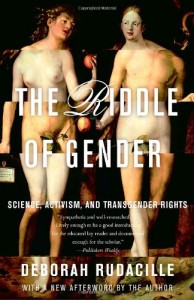
Author: Deborah Rudacille
Publisher: Pantheon, 2005
When Deborah Rudacille learned that a close friend had decided to transition from female to male, she felt compelled to understand why.
Coming at the controversial subject of transsexualism from several angles–historical, sociological, psychological, medical–Rudacille discovered that gender variance is anything but new, that changing one’s gender has been met with both acceptance and hostility through the years, and that gender identity, like sexual orientation, appears to be inborn, not learned, though in some people the sex of the body does not match the sex of the brain.
Informed not only by meticulous research, but also by the author’s interviews with prominent members of the transgender community, The Riddle of Gender is a sympathetic and wise look at a sexual revolution that calls into question many of our most deeply held assumptions about what it means to be a man, a woman, and a human being.
Reviews“Amazing! This is the long-awaited fusion of science, criticism, and compassion that scholars of gender–and everybody else–have been waiting for. The Riddle of Gender is meticulous, funny, brilliant, and readable. . . . Not just for those interested in the enigmas of sex and gender, but for those interested in the universal mystery of how we become ourselves” (Jennifer Finney Boylan, author of She’s Not There: a Life in Two Genders)
“Science writer Rudacille’s sympathetic and well-researched elucidation of the threads that make up the tangled issue of gender variance, most visible in transsexuals, is lively enough to be a good introduction for the educated lay reader and documented enough for the scholar” (Publishers Weekly)
“How do nature and nurture interact to produce a persistent awareness of one’s identity as male or as female — that is, one’s “gender identity,” as this term is now used in the official diagnostic manual of the American Psychiatric Association? How does understanding the psychology of transgendered people — those who fall between the polarities of being male and being female — illuminate gender psychology? Organized as verbatim interviews with commentary, The Riddle of Gender grapples with these questions in a stimulating way” (New England Journal of Medicine)
“While Rudacille’s science is strong and compelling, the book’s overall strength lies in the voice behind it” (PrideSource)